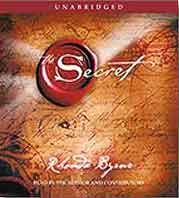 In the spiritual system of the money-minting hit book and DVD “The Secret,” negative thoughts are a no-no. Freak out about your bike being stolen, and you can kiss it goodbye. Think “fat thoughts,” and you put on pounds. Some mental health professionals are complaining that “The Secret” may convince less stable readers–those who are awash in largely involuntary negative thoughts all the time–that they are to blame for any troubles that might befall them, including sexual abuse, incarceration, and other typical problems of the disturbed.
In the spiritual system of the money-minting hit book and DVD “The Secret,” negative thoughts are a no-no. Freak out about your bike being stolen, and you can kiss it goodbye. Think “fat thoughts,” and you put on pounds. Some mental health professionals are complaining that “The Secret” may convince less stable readers–those who are awash in largely involuntary negative thoughts all the time–that they are to blame for any troubles that might befall them, including sexual abuse, incarceration, and other typical problems of the disturbed.
It comes as a shock to see Rhonda Byrne, the Australian television and film producer behind “The Secret,” coolly confirm the basis of this criticism. Asked about the victims of 9/11 and Hurricane Katrina, Bryne told the Associated Press recently, “If their dominant thoughts and feelings were in alignment with the energy of fear, separation, powerlessness and having no control over outside circumstances, then that is what they attracted.” She gives herself a backdoor by calling the universe’s energy “impersonal” and pointing to the “miraculous stories of survival” in wide-scale tragedies, but she never gets pushed off-message.
One of spirituality’s great quests has always been to explain suffering in the world. Sin–call it negative thinking in “Secret”-speak, but in Byrne’s system it amounts to the same thing–has long been one of the usual suspects. When the Old Testament Israelites fell out with God, he usually sent them off to exile until they thought better of it. Jesus cured the lame and the blind by forgiving their sins. Jerry Falwell resurrected this theological tradition when he blamed the 9/11 attacks on homosexuals and abortionists. Byrne replaces these Christian Right targets with negative thinking. But for all her New Age gloss, the view of suffering in “The Secret” appears to be the same old, same old.
More from Beliefnet and our partners


